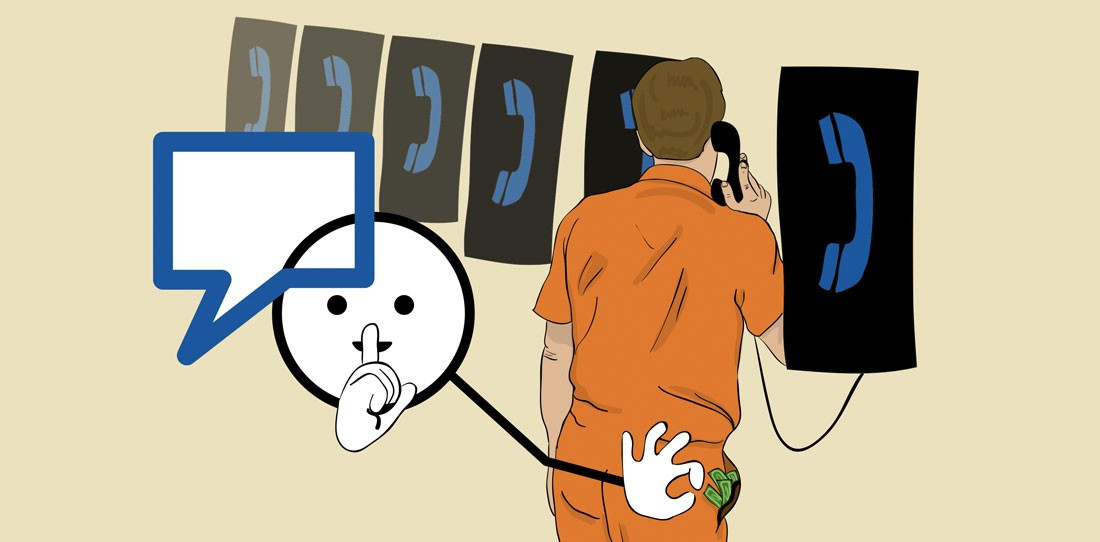When talk is not cheap
As #BellLetsTalk trends, people in prison are priced out of community support
The centerpiece of the Bell Let’s Talk campaign was Jan. 29, but the public awareness campaign stretches from early January well into March. Alannah Fricker, president of Canadian Students for Sensible Drug Policy (CSSDP) out of Ryerson University, is planning events to call the corporation out for profiting off of incarcerated people in federal and provincial prisons.
Fricker says Bell’s double standard has had major consequences for incarcerated people. Bell currently has an exclusive contract with the Ontario government to provide phone services, and with their exorbitant call rates, they make it hard for inmates with mental illnesses to reach out for help and support.
Those living under the Bell prison phone monopoly cannot call cell phones, have a 20-minute call time restriction, cannot receive voicemails and are charged over a dollar per minute after the first minute. Fricker says that with restrictions like these, important phone calls between incarcerated people and their support networks can become tense – if not impossible.
“Bell acts like they’re champions of mental health in Canada,” Fricker says, “but we know that they have bad workers’ rights and workers’ health standards for their employees, and that they really profit off of marginalized people in prisons, their families, their social support workers and networks and their lawyers.”
Fricker says the contract between Bell and the Government of Ontario means that the province also profits from these call fees.
The Government of Manitoba, meanwhile, contracts its prison phone system out to an American phone company, called Synergy. Jon Benson, who is an organizer with Bar None Winnipeg, a Winnipeg-based prison abolition solidarity group, says “phone calls went from being free to costing $3 for a local phone call, regardless of how long the call is, and a little bit more for long-distance calls.”
“That was a terrible thing both for people in prison and those outside, because (those in prison) have such limited access to family and community support, so they’ve made (accessing those supports) a very hard economic reality.”
Benson says that, given how many people are in prison because they can’t afford bail and the over-policing of impoverished and Indigenous people, the phone tolls target and isolate low-income individuals from their support networks.
This is hardly the only way that prisons restrict access to vital support networks.
“Prisons have an ultimate authority that very few institutions have. They can make incredibly arbitrary decisions, and they don’t have to tell you why they made them or if they’re going to change their minds about them,” Benson says, citing unexplained visitation denials, access denials and random lockdowns. “For families that need that access to support their loved ones, that can be an incredibly traumatizing experience.”
Prisons also tend to be geographically isolated from general population centres, which is why one of Bar None’s main initiatives is a rideshare program for the families and loved ones of incarcerated people.
“Prisons are set up in places that are incredibly inaccessible for people who don’t own their own car, and a lot of people are in prison because they don’t have money and don’t come from families or communities with the ability to provide financial support,” Benson says.
CSSDP will run events in Toronto to raise awareness about Bell’s prison phone system monopoly, but encourage everyone to sign their online petition to end the contract, print out the petition sheet to get physical signatures and contact their provincial and federal representatives. They also encourage people to talk about the issue on social media using the hashtags #ListenUpBell, #BellLetUsTalk, #LetsTalkBell, #BellPrisonPhones, #CrisisInCorrections and #BoycottBell. Bar None Winnipeg is looking for volunteer drivers, even if they do not have access to a car, and accepting donations at barnonewpg.org.
Published in Volume 74, Number 16 of The Uniter (January 30, 2020)








